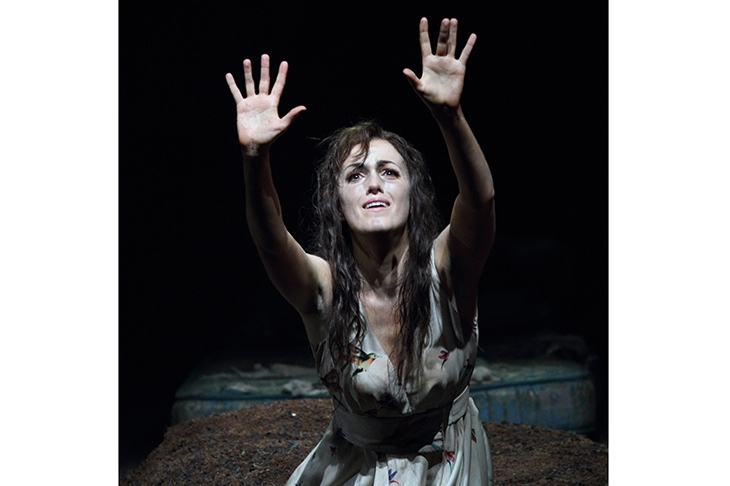Handel’s Rinaldo has not been highly regarded even by his most ardent admirers. I have never understood why — even less so after the recent performance at the Barbican, with stunning forces, including the English Concert, under the inspiring direction of Harry Bicket.
Certainly the plot is absurd, with a last-minute mass conversion of Muslims to Christianity in order to bring things to a happy conclusion. But there are only six main characters in complicated relationships with one another, turning on their love and hatred like a switch, and going through the usual hoops; that is what Handel operas are. The penny has dropped with me, almost too late, that it is a complete mistake to look for characterisation in Handel. Strong emotions are expressed, and he is a master of putting them into music, but who is experiencing and expressing them is a matter of indifference. Can any admirer of Handel swear that — with the exception of a tiny handful of his works, such as Giulio Cesare — he gives a damn about the outcome of his operas. Who ends up happy and who distraught or dead? Think of the anxieties and relief we feel during the operas of Monteverdi or Mozart or Wagner or Puccini, and there is no comparison. Once that’s granted, Handel is expressive on a grand scale, and in Rinaldo as much as in almost any of his operas. It has the advantage, too, of not having a merely expository first act, as so many of his operas do. Absorbing from the start, it achieves an even higher level in Act Two, before the mild longueurs of Act Three.
Harry Bicket’s visits with a Handel opera have become an annual occasion at the Barbican; concert performances, but that is in their favour. When the opera was first presented, its main claim to attention was the amazing scenery and the ‘machines’, but scenery nowadays tends to be amazing in a quite different way, and it’s a relief to me to be without it. Few performances, though, have had such superb line-ups of singers as Rinaldo. Probably the best-known name here was Iestyn Davies, the great counter-tenor of the moment, in the title role, as he deserves to be. Some of the other singers were less familiar, but the second counter-tenor, the Pole Jakub Jozef Orlinski, after a slightly tentative Act One, showed that he will soon be a familiar name. Joélle Harvey was a stunning Almirena, with her show-stopping ‘Lascia ch’io pianga’. Go to YouTube if you have a spare half-hour and compare all the big names singing that piece: for me most of them tend to queen it up, whereas Harvey was moving in the simplicity of her rendering. Perhaps the most dazzling part of the night was the end of Act Two, when the harpsichordist Tom Foster took over and gave a stunning virtuoso performance expressive of Armida’s determination to have vengeance. These occasions should be recorded.
English National Opera’s new production of La traviata requires grief rather than critique. The evening was so comprehensive a flop that it is painful to go into detail. I will just mention that Leo McFall conducted with sensitivity and a sure, if slightly slow, sense of pacing, and the orchestra responded superbly. And Alan Opie, now with the company for 50 years, gave a lesson in dignity and vocal warmth while playing the character I loathe most in all opera, the elder Germont. Something is odd, though, when the sententious old creep gets by far the biggest applause of the evening for his ‘Di Provenza il mar’ — Englished, of course, by Martin Fitzpatrick, in an unwieldy way, with many misplaced accents and clumsy constructions.
About the rest of the leading roles there is little positive to say. The two main characters are miscast, Claudia Boyle having far too small a voice for most of Violetta’s part, though she pulled out the stops once or twice to adequate effect. Mostly, though, and especially in such key passages as her agonised interjections in Act Two scene ii while the men play cards, she was barely audible. The South African Lukhanyo Moyake needs acting lessons. At present he is a fairly large stage absence, and his voice is more braying than singing.
Singing actors far more adequate than these would have been sunk by the production, Daniel Kramer’s first as artistic director of ENO. The opening scene suggested a Las Vegas brothel, with men in their underwear, white boxers or something kinkier. Violetta, everything in the text and music makes clear, is higher class than this unenthusiastic orgy, repeated in Act Two. The next scene takes place on her lawn, with a double bed swaying above it; in despair she rips up the turf and buries herself under it, a foretaste of her digging her own grave in the last act. And so on. Nothing worthwhile survived.






Comments